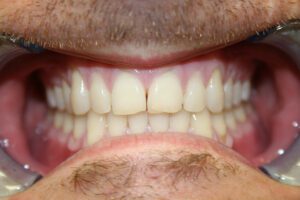 The most common complication associated with dental implants is problem with implant integration that is failure to fuse with the bone and this often leads to implant failure. This complication becomes even worse if the person undergoing implant surgery is a smoker. Dental implants need oxygen to fuse correctly with the bone. If there is not a good blood flow to the tissues and the bone, the implant will not be able to stay in proper place. Remember that nicotine found in tobacco has a negative effect on blood flow that makes bone healing after implant surgery even more difficult. That is why smokers are more vulnerable to developing various implant complications including peri-implantitis, which causes inflammation of the tissues surrounding the dental implant.
The most common complication associated with dental implants is problem with implant integration that is failure to fuse with the bone and this often leads to implant failure. This complication becomes even worse if the person undergoing implant surgery is a smoker. Dental implants need oxygen to fuse correctly with the bone. If there is not a good blood flow to the tissues and the bone, the implant will not be able to stay in proper place. Remember that nicotine found in tobacco has a negative effect on blood flow that makes bone healing after implant surgery even more difficult. That is why smokers are more vulnerable to developing various implant complications including peri-implantitis, which causes inflammation of the tissues surrounding the dental implant.
There is also a greater risk of bone loss following implant surgery in smokers than in people who do not smoke. Periodontal disease or gingivitis (inflammation of the gums) is more commonly seen in smokers because tobacco has been found to be the main culprit in developing the condition. As a result the person becomes susceptible to tooth loss and in need of implant surgery more so that those who do not consume tobacco as a habit. Dentists should make sure their patients who undergo implant surgery do no smoke afterwards; otherwise these complications are likely to occur and will cause the implant to fail.
Moreover, smoking inhibits the action of antibiotics given to heal the bone quickly. Wounds that are in the process of healing and they come into contact with smoke, become worse and cause the implant to lose strength. Smokers are also at an increased risk of developing oral cancer and other serious disorders associated with teeth and gums. Smoking is therefore considered injurious to overall health and more so to a person’s oral health. It has been found that pipe smoking is even worse than cigarettes because it generates more temperature in the upper jaw and hinders the flow of blood to this area.
Some dentists even refuse to perform an implant surgery on smokers simply because they think the implant will not fuse properly and consequently fail. It is recommended to stop smoking or consuming tobacco in any other way 3 days prior to an implant surgery. Moreover, they should stay away from tobacco following the surgery at least for the healing period of the tissue, which can extend to 3 to 4 weeks. Improper healing not only causes the implant to fail but also forms other complications that may even take you to the hospital.
Smoking not only increases the risk of peri-implantitis but is also a major cause of bone and tissue loss. Even minor procedures like fillings require that you do not smoke for at least a week following the treatment. Dental implants are more complicated because they expose the inside of the gum to whatever is consumed through the mouth. It is therefore advisable to quit smoking before undergoing an implant surgery.

